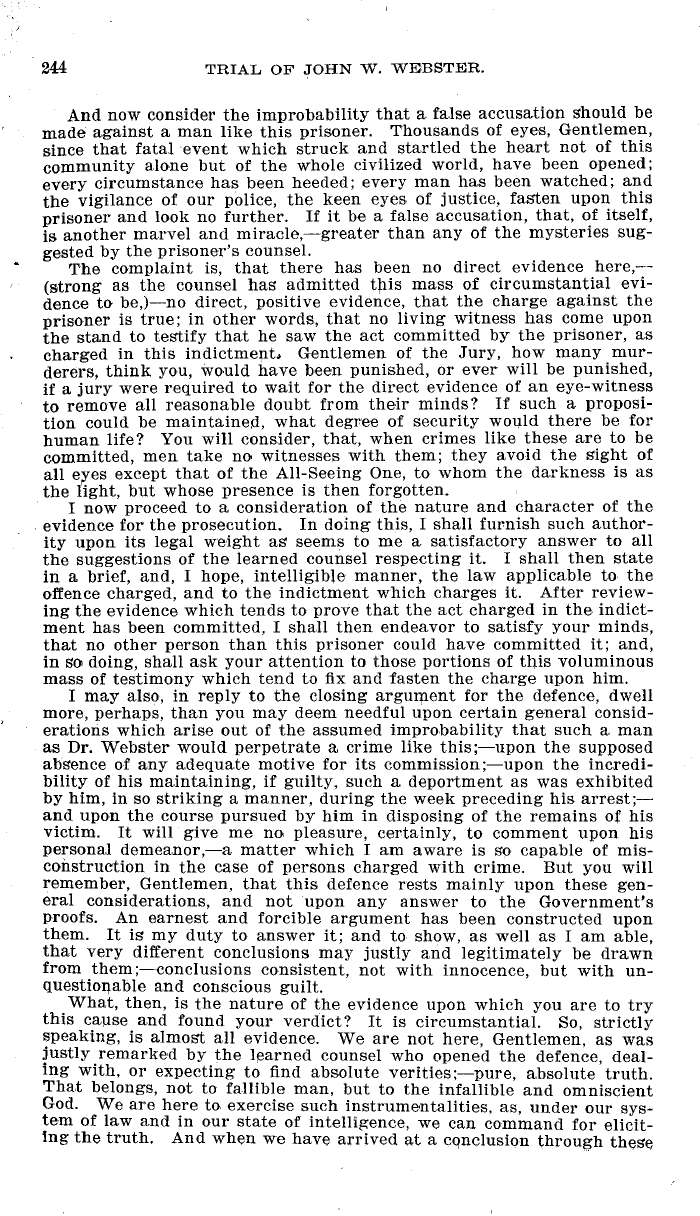|
244 TRIAL OF JOHN W. WEBSTER.
And now consider the improbability that a false accusation should be
made against a man like this prisoner. Thousands of eyes, Gentlemen,
since that fatal event which struck and startled the heart not of this
community alone but of the whole civilized world, have been opened;
every circumstance has been heeded; every man has been watched; and
the vigilance of our police, the keen eyes of justice, fasten upon this
prisoner and look no further. If it be a false accusation, that, of itself,
is another marvel and miracle,-greater than any of the mysteries sug-
gested by the prisoner's counsel.
The complaint is, that there has been no direct evidence here,-
(strong as the counsel has admitted this mass of circumstantial evi-
dence to be,)-no direct, positive evidence, that the charge against the
prisoner is true; in other words, that no living witness has come upon
the stand to testify that he saw the act committed by the prisoner, as
charged in this indictment. Gentlemen of the Jury, how many mur-
derers, think you, would have been punished, or ever will be punished,
if a jury were required to wait for the direct evidence of an eye-witness
to remove all reasonable doubt from the-it minds? If such a proposi-
tion could be maintained, what degree of security would there be for
human life? You will consider, that, when crimes like these are to be
committed, men take no witnesses with them; they avoid the sight of
all eyes except that of the All-Seeing One, to whom the darkness is as
the light, but whose presence is then forgotten.
I now proceed to a consideration of the nature and character of the
evidence for the prosecution. In doing this, I shall furnish such author-
ity upon its legal weight as seems to me a satisfactory answer to all
the suggestions of the learned counsel respecting it. I shall then state
in a brief, and, I hope, intelligible manner, the law applicable to the
offence charged, and to the indictment which charges it. After review-
ing the evidence which tends to prove that the act charged in the indict-
ment has been committed, I shall then endeavor to satisfy your minds,
that no other person than this prisoner could have committed it; and,
in soo doing, shall ask your attention to those portions of this voluminous
mass of testimony which tend to fix and fasten the charge upon him.
I may also, in reply to the closing argument for the defence, dwell
more, perhaps, than you may deem needful upon certain general consid-
erations which arise out of the assumed improbability that such a. man
as Dr. Webster would perpetrate a crime like this; upon the supposed
absence of any adequate motive for its commission; upon the incredi-
bility of his maintaining, if guilty, such a deportment as was exhibited
by him, in so striking a manner, during the week preceding his arrest;
and upon the course pursued by him in disposing of the remains of his
victim. It will give me no pleasure, certainly, to comment upon his
personal demeanor,-a matter which I am aware is so capable of mis-
construction in the case of persons charged with crime. But you will
remember, Gentlemen, that this defence rests mainly upon these gen-
eral considerations, and not upon any answer to the Government's
Proofs. An earnest and forcible argument has been constructed upon
them. It is my duty to answer it; and to show, as well as I am able,
that very different conclusions may justly and legitimately be drawn
from them; conclusions consistent, not with innocence, but with un-
questionable and conscious guilt.
What, then, is the nature of the evidence upon which you are to try
this cause and found your verdict? It is circumstantial. So, strictly
speaking, is almost all evidence. We are not here, Gentlemen, as was
justly remarked by the learned counsel who opened the defence, deal-
ing with, or expecting to find absolute verities; pure, absolute truth.
That belongs, not to fallible man, but to the infallible and omniscient
God. We are here to exercise such instrumentalities, as, under our sys-
tem of law and in our state of intelligence, we can command for elicit-
ing the truth. And when we have arrived at a conclusion through these
|

